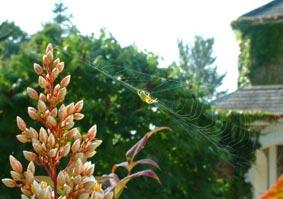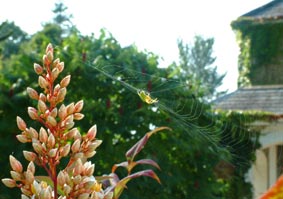Greets, shoots and leaves

The female spider lives up to her reputation as a dangerous date, says Éanna Ní Lamhna
Little Miss Moffat has a lot to answer for. We're fed this nursery rhyme as children and, as a result, many otherwise normal adults are reduced to the screaming heeby-jeebies by just the sight of a spider. Is this fear justified?
Many of us must be familiar with the garden spider, an expert web-spinner, who seems to be especially obvious in the month of September. This spider has a white cross on its back and stripey legs, making it easy to identify. It spins its web from the centre out – thin sticky strands which act as a trap. The spider sits at the side, attached to the last silken strand and waits for a the vibrations on the end of the strand to alert it that a fly has blundered in. Then out it charges across the web to the struggling victim, who is stuck fast. A quick bite with a dash of venom to the hapless fly's neck and he is no more. He can be eaten on the spot by sucking out all the juicy insides or, if the spider is a trifle full, the fly can be embalmed in new silk and hung up in the spider's larder for leaner times.
The fly hasn't a chance once it touches the web; the sticky silk quickly entraps it. But did you ever wonder how spiders don't get caught in their own webs? There are two reasons. The main anchor stays of the web are not sticky, and the spider knows to move along these highways. And even when it gets to the fly in the sticky bit, its oily feet prevent it from catching on the strands, a bit like the way a plaster won't stick to your knee if you put ointment on the cut first.
This means that spiders don't get stuck in each other's webs either, but why would you want to go calling if your neighbour is a savage cannibal? Spiders, particularly females, have no problem eating other spiders that come their way. So if a dashing young spider's thoughts turn to love, should discretion be the better part of valour? Certainly the phrase "faint heart never won fair lady" could have been coined for the Lothario spider out on the town. How to win the lady without becoming her dinner? Well, like any good suitor he must bring a gift when he comes calling. A nice juicy fly will fit the bill. Mating in most species involves a close, intimate encounter, but our hero really doesn't want to get too close. So in matters amorous his interesting body design comes into its own. Male spiders can transfer their sperm to their palps, which literally gives them breathing space.
So a spider out for a night on the town arms himself with a juicy present, arranges his personal toilette and comes calling on the neighbouring web. He indicates to herself that he has arrived by vibrating the sticky silk in the web. She thinks that dinner has landed and rushes out to polish off the intruder. Our hero quickly thrusts the gift-wrapped fly at his ladylove and while she is distracted unwrapping the present, he gingerly mates with her from as far away as possible. But if he hasn't wrapped the present enough, or lingers too long in the love department, she has no compunction gobbling him up.
It makes no difference to the survival of the species if the female eats the male after mating since the vital sperm and male genes have already been transferred. In fact, the extra protein will come in handy for the ensuing egg-laying. But our hero would like to live another day, so he tries his best to make a speedy departure.
